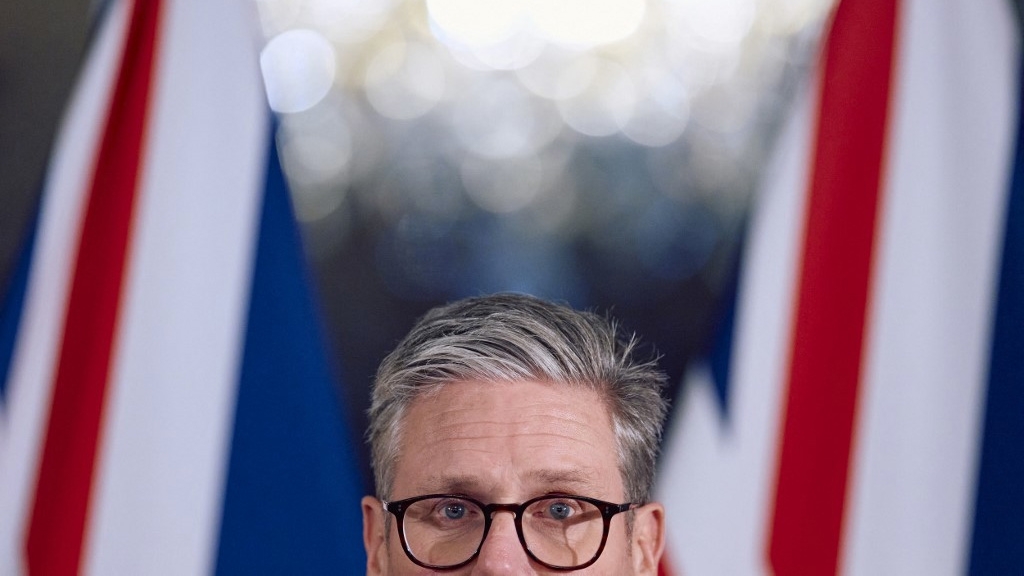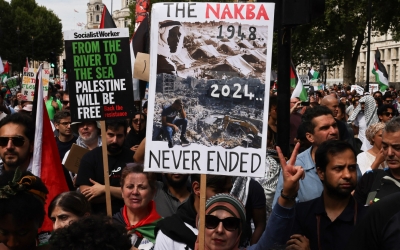War on Gaza: How Starmer's Labour government has enabled Israel's genocide

One hundred days ago, when a new Labour government was elected in the UK, some entertained a few slithers of hope that it could be marginally better than its Tory predecessor. Would significant changes in UK policy on Gaza, and towards the Palestinians, follow?
The bare minimum hope was that Prime Minister Keir Starmer and his foreign secretary, David Lammy, would display greater urgency to stop Israel’s genocide.
Instead, the past 100 days have witnessed political complacency and complicity, as Palestinians and Lebanese have seen carnage, devastation and death - and in Gaza right now, erasure and extermination - including the gruesome video of 19-year-old student Sha'ban al-Dalou, burnt alive in a tent he was displaced to by an Israeli air strike which hit Al-Aqsa Hospital.
Israel’s promises to do to Lebanon what it has done to Gaza are being fulfilled. No number of statements of UK government “concern”, through which it aims to abdicate itself, can ever match the growing list of Palestinians and Lebanese killed, maimed and displaced by Israeli bombardment.
“Gaza is being erased before our eyes,” a group of 15 NGOs stated this month, highlighting the UK government’s failure to uphold international law.
New MEE newsletter: Jerusalem Dispatch
Sign up to get the latest insights and analysis on Israel-Palestine, alongside Turkey Unpacked and other MEE newsletters
Many of these organisations, which have on-the-ground expertise and personal investment, had already presented the government with a 100-day plan in July. This included an end to all arms sales to Israel, securing a permanent ceasefire, and respecting the independence of both the International Criminal Court (ICC) and International Court of Justice (ICJ).
It was welcome news that the UK government reversed some appalling decisions made by the previous administration: it restored funding to Unrwa, the UN agency for Palestinian refugees, and dropped its objection to the ICC’s application for arrest warrants for Israeli Prime Minister Benjamin Netanyahu and Defence Minister Yoav Gallant.
That even the previous government was considering sanctioning far-right ministers, Itamar Ben Gvir and Bezalel Smotrich, demonstrates a failure of the current government to act, especially when the genocidal rhetoric of these extremists is so stark.
There are zero excuses for the Labour government not to both sanction these ministers, and end all arms sales to Israel. But UK policy must go much further in tackling Israeli impunity and a lack of accountability.
There needs to be a total policy reset on relations with Israel, which is neither a good-faith actor, nor an ally.
Cost-free crimes
If the UK government believes in the human rights and dignity of Palestinians - that they, too, deserve justice and accountability - then Israeli impunity must end.
So far, Israeli crimes have been cost-free. The world’s failure to hold Israel accountable in Gaza and the West Bank meant Netanyahu was confident that this would also be the case in Lebanon. If the UK believes in the UN, then why the silence when Israel moved to designate one of its agencies, Unrwa, as a terrorist organisation? The Knesset is voting for its removal from Jerusalem and elsewhere in the West Bank and Gaza.
A similar silence has followed Israeli attacks on UN personnel in southern Lebanon.
Follow Middle East Eye's live coverage of the Israel-Palestine war
Governments and politicians frequently accuse human rights and aid groups of a lack of gratitude. Their accusations against Palestinians are even more fierce: that somehow bare-minimum decisions, or a slight change of tack, warrant heaps of praise and congratulatory statements - or that the government should be cut some slack, simply because it’s not as outwardly hostile as the previous one.
Starmer’s government, even after 100 days in power, still belittles the scale of Palestinian and Lebanese suffering, as it did in opposition. It does not appear to understand people’s grief and anger at what is happening to them.
The UK government and its allies are at odds with what their public thinks and demands. According to a recent opinion poll commissioned by Medical Aid for Palestinians and my organisation, the Council for Arab-British Understanding, 58 percent of the British public supports a full arms ban on Israel. A massive 84 percent believes that the ICC’s arrest warrants should be respected. Such figures are seen across Europe, even in Germany.
This spinelessness has consequences. The US administration will take Britain for granted. Israel, too, will see only weakness
There appears to be a total lack of understanding of domestic and international anger towards the UK’s, and Labour’s, position on this issue. The UK’s response to Israel's war on Gaza has shattered its reputation.
While some expected that Labour would be significantly better than the previous government, the reality is that it has been only marginally less bad. While the Tories had nothing to lose politically on Palestine, which is not a key concern for their vote base; in contrast, the core of Labour backs Palestinian rights. Starmer has lost their support.
The UK’s failure to uphold international law when it comes to Israel has smashed the credibility of the party’s claim that international law is at the heart of Labour’s policy. This is despite the fact that the prime minister, foreign secretary and attorney general are human rights lawyers, surely fully aware of how international law has been trampled on by Israel.
Starmer may never truly recover from his remarks in October 2023, when as leader of the 0pposition he said Israel had the right to cut off Gaza’s water and electricity. Later he backed Israel's war continuing for many months and only called for a ceasefire once tens of thousands of Palestinians had been killed.
Since then, his actions have demonstrated that the party leadership never learned a lesson from these catastrophic positions, despite anger from Labour parliamentarians, the party’s membership and the public.
Starmer had a small window when he became prime minister to prove the doubters wrong. He has failed.
Out of sync
Israel is on trial for genocide at the International Court of Justice. The government says nothing, and deems references to genocide unhelpful. Would ministers feel the same if they were on the receiving end of Israel’s atrocities?
The Labour government has also been largely silent on the ICJ’s advisory opinion that the occupation is illegal, that Israeli practices amount to apartheid and systematic discrimination, that Israel must pay reparations to Palestinians, that a system of apartheid probably exists in occupied Palestinian territory, and that international complicity with Israel’s acts of unlawfulness must end. This was back in July.
It claims to agree with the ICJ’s core findings without specifying which ones. The government has not stated the occupation is unlawful. It has not called for illegal settlements to be dismantled. It should be taking action to ban trade with settlements and its failure to do so has to be seen as amounting to complicity.
A staggering lack of urgency, along with complacency, has characterised the approach of this government, as it did its predecessor. UK policy is totally out of sync with the catastrophic emergencies on the ground, despite endless warnings that the failure to procure a ceasefire in Gaza would lead to a broader regional war. That is now upon us, and the consequences will be global.
Britain's political leadership has been utterly ill-equipped to deal with the horrors faced by Palestinians in Gaza. Calculations were likely made that it would never get as bad as it has or that Netanyahu would eventually behave rationally; the Labour leadership was counting on it all being over before they got into office.
Rather than preventing this regional catastrophe, Starmer and Lammy have focused on cosying up to Washington, nervous of the outcome of the November election. This is both political stupidity and spinelessness, and it has consequences - especially when Israeli government officials frequently declare to the world who they are, including numerous genocidal statements on Gaza and Lebanon.
The US administration will take Britain for granted. Israel, too, will see only weakness.
The UK is also complicit in the ongoing war, as parts for the F-35 fighter jets that are bombing Gaza and Lebanon are made in Britain. When Lammy said “with regret” last month that around 10 percent of UK arms licences to Israel would be suspended, it was as if he was embarrassed to hold Israel to account even in this meagre form - a far cry from the steadfast defence of human life, rights and dignity that it should have been.
Israel is still rewarded the status of an ally, its "right to self-defence" still lauded despite the genocide, an interpretation of "self-defence" that is a cruel fallacy, synonymous with atrocity.
Sadly, the dehumanisation of Palestinians and Lebanese underlines the lack of action to end this genocide - one that has been exacerbated by the anti-Palestinian and anti-Arab racism indulged by the British political class.
The experiences of those suffering under apartheid, occupation and genocidal violence - all live-streamed to the world - continue to be denied.
We are crying out for principled and compassionate political leadership that stands in solidarity with those enduring the genocide, and seeks to end it with urgency, rather than standing unashamedly with those perpetrating it.
The views expressed in this article belong to the author and do not necessarily reflect the editorial policy of Middle East Eye.
Middle East Eye delivers independent and unrivalled coverage and analysis of the Middle East, North Africa and beyond. To learn more about republishing this content and the associated fees, please fill out this form. More about MEE can be found here.






